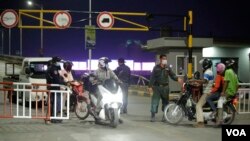At least five people have been charged, detained, or convicted for allegedly violating the new COVID-19 law during a two-week lockdown enforced in Phnom Penh and Takhmau.
The authorities have arrested at least five men in separate incidents for violating lockdown measures. Three men, including Ung Chanthouk, who is a two-star National Police official, were arrested for social and drinks gathering, which is against current restrictions.
The trio has been charged under Article 4 and 11 of the COVID-19 law, which carries a maximum of three years in prison, said Kuch Kimlong, spokesperson of the Phnom Penh Municipal Court.
Article 4 bans any gatherings that may cause the spread of COVID-19, and Article 11 penalizes “intentional obstruction or deterrence of the enforcement of a measure.”
Prime Minister Hun Sen also stripped the police official of his rank and was fired from the National Police force, according to a Royal Decree issued on April 17 and seen by VOA Khmer
“That man has to be sentenced...don’t release him. [He] has to be sentenced,” Hun Sen said in an audio voice released on Saturday.
The government last Wednesday enforced a 14-day lockdown in Phnom Penh and Takhmau due to the rapid increase in COVID-19 cases. The government has extended a travel ban to April 28 and also banned the sale of alcohol.
Hun Sen has been critical of people who have attempted to subvert some of the rules, threatening to extend the lockdown.
The presiding judge, Ouk Sovannarith, said the three men have asked for legal representation, according to Kuch Kimlong.
“They were sent [Sunday] afternoon [to court] and presiding judge Ouk Sovannarith has put them in a pre-trial detention,” he said, adding that a trial could start as early as two weeks.
In two separate cases, Seang Rangsy was arrested for posting a video of himself driving through the city in a Lexus, according to Kuch Kimlong, and another man, Dara Rath Sokun, was detained for cutting police tape to enter a restricted area. Dara Rath Sokun was quickly convicted and sentenced to 12 months in prison.
Human rights experts and observers have been critical of the COVID-19 law, which they say had harsh prison sentences and can be used to violate citizens’ rights.
Three special rapporteurs, including Rhona Smith who is the special rapporteur for human rights to Cambodia, last week expressed “serious concern” over “harsh new legal and administrative measures” to tackle the COVID-19 pandemic in a statement, referring to the Law on Preventive Measures Against the Spread of COVID-19 and other Contagious Diseases.
“We are concerned that the administrative and penal measures, including excessive prison sentences and fines provided in the law, appear to be disproportionate and unwarranted. All measures taken to fight the pandemic, including possible punishments, should be necessary and proportionate and not be used excessively,” the April 12 statement reads.
The law came into effect on March 11 and was a response to the current cluster of COVID-19 cases and includes harsh punishments such as a 20-year prison term and fines of up to 20 million riels, around $5,000, for those convicted of violations.
Chak Sopheap, executive director at the Cambodian Center for Human Rights, said the government should disseminate more information to the public about their measures to ensure clarity.
“I encourage the continued dissemination of information [about these measures] for [better] understanding and for people to participate in fighting the virus spread,” she said.
The human rights defender urged that all the arrested people have a right to a fair trial and should be given defense lawyers.
“In any circumstance, even before the pandemic, the assurance of the right to a fair trial is very necessary,” Chak Sopheap said.








